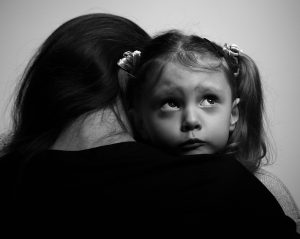Why Are So Many Parents Limited in Loving Their Children?
 In order to place the title of this blog in context, I would define parental love as behavior that enhances the well-being and development of children. As such, “love” would be all that is nurturing and supportive of the evolution of the child’s unique personality. Conversely, it would be a distortion to define as “loving” those responses that are in any way detrimental to the child’s psychological growth or cause painful wounds to the child’s psyche or predispose a lifetime of maladaptation and pain.
In order to place the title of this blog in context, I would define parental love as behavior that enhances the well-being and development of children. As such, “love” would be all that is nurturing and supportive of the evolution of the child’s unique personality. Conversely, it would be a distortion to define as “loving” those responses that are in any way detrimental to the child’s psychological growth or cause painful wounds to the child’s psyche or predispose a lifetime of maladaptation and pain.
Parental love would include genuine expressions of warmth: a smile or friendly look that conveys empathy and good humor; physical affection; respectful, considerate treatment; tenderness; a willingness to be a real person with the child as opposed to acting the role of “mother” or “father;” and a sensitive attunement and responsiveness to the child. Attuned parents have the ability to adjust the intensity and emotional tone of their responses to accurately match their child’s feeling state and needs. During infancy, attuned interactions between a baby and its mother (or primary caregiver) are especially important because they provide the baby with the environment necessary for learning how to regulate emotions and for developing empathy.
In my observation of families, I have noted countless examples of well-meaning parents engaging in behavior that is insensitive, mis-attuned, or harmful to their children, while earnestly believing that they love them and have their best interests at heart. These parents are telling the truth, although on a defensive level, when they tell their adult children who have been emotionally hurt, that they loved them and did the best they could for them. It’s true that they did the best that they were capable of, but more often than not, they simply weren’t able to really see their child as a separate person and meet his or her needs. No matter how well-intentioned, many people are unfortunately not prepared for the task of raising children.
There are several reasons why it’s often difficult for parents to love their children.
2. Parents who are undeveloped or immature experience their children as an unwanted, intimidating dependency load. They find it threatening to bear the responsibility and extensive care that the baby and developing child require and may even come to resent their offspring.
3. Many people find it difficult or intolerable to accept love and, in particular, the simple direct loving expressions of children. If the parents have been hurt in their developmental years they will have problems in accepting love and intimacy from their children. Faced with the emotional pain that it causes them, parents will unconsciously distance themselves from their child.
4. If parents have unresolved trauma in their own lives they will tend to be mis-attuned to their children, especially when their children approach periods in their lives that were traumatic for the parent. They may react by becoming rejecting or may overcompensate at those times. Neither reaction is appropriate to or constructive for the child.
For example, a parent who cannot bear to be reminded of his own childhood sadness may be vindictive or punishing to his children when they cry. Another parent may suppress her children’s pain in just the opposite way—by over-comforting and over-protecting them. In any case, the child is always more expendable than the parent’s defense system. The more self‑protective a person is, the more he or she will act out his or her defenses on the child and progressively fail to perceive the child correctly and encourage healthy development.
5. Having children reminds parents that time is passing and tends to increase their death anxiety. This can cause tension and even resentment in the parent and a self protective, defensive retreat from feeling that is directly or indirectly hurtful to their children.
6. Parents tend to use their children as immortality projects, a process that has a destructive effect on their offspring. In order to serve this purpose, children must replicate their parent’s attitudes and choices. If they differ, their independent actions are misinterpreted as defiant or rebellious. Parents try to impose sameness on their children because they can’t live on through their children if they are different from them. For example, if you are religious and your child is a non-believer or if you are a Democrat and your child is a Republican, your child no longer serves the necessary function. Obviously, impressing sameness is highly damaging to children. Each child is genetically different and has a unique agenda and personal destiny.
7. Parents’ unfulfilled primitive hunger for love and care from their childhood causes them, in turn, to focus these strong desires on their children. They confuse the powerful feelings of longing and possession they have toward their offspring for genuine feelings of love. Children who are caressed by a hungry and needy parent will not feel “seen,” understood or secure, but instead will become refractory to physical touch. The “loving” fingers of the immature parent are felt as possessive, sucking tentacles, which drain the children rather than nurture them. This type of parent will cause children to have feelings of being trapped or suffocated by close relationships in later life. As adults, they may experience affection as physical or psychological pain.
8. Due to inadequate or problematic parenting styles, many children develop traits that are unlikeable or intolerable. They may become unruly, defiant, disobedient, obnoxious, demanding, hostile or generally unpleasant. Even though they have been a primary cause of these behaviors, parents find it difficult to love or even like a child who exhibits these attributes.
To summarize, almost all parents feel that they love their children. But what parents feel internally must have an external component in actions that are loving in order to have a positive effect on their children. Parents’ good intentions are not a substitute for nurturing love, which can only be provided by a psychologically healthy and independent adult. Both the intention and the capacity to love are necessary to sustain the small child in his or her growth toward maturity.
The assumption that parents, especially mothers, have a “natural” love for their child is a fundamental part of our belief system and the core of family life and society. Very often this myth has an adverse effect in that it leads to a failure to challenge negative behaviors within family life. It also intensifies parents’ guilt. These guilt feelings further contaminate the situation for those individuals who may be unable, because of their own upbringing, to provide their children with the necessary love and care they need.
Children do need and deserve love and we must provide it or they will suffer emotional pain. Recent research in the neurosciences has shown that the way parents interact (or fail to interact) with children becomes hardwired in their children’s brains, often before they are capable of formulating words to describe what they are experiencing. As they grow older, children find numerous ways of defending themselves in order to relieve or numb their pain. In the process of dulling their pain, they close off many aspects of themselves and, to varying degrees, become emotionally deadened.
Indeed, if the illusion of unconditional parental love were withdrawn from the child‑rearing scene, it would be better for all concerned. It serves no constructive purpose for parents to conceal their inadequacies from the child. In fact, an honest acceptance of their deficiencies would enable both parent and child to cope with reality devoid of the additional defensive pressure. With a lessening of this pressure and the subsequent relaxation for both parent and child, they may even regain genuine loving feelings and regard for one another.
Lastly, children whose parents have, for the most part, resolved their issues of trauma and loss from the past have a better chance. In Compassionate Child-Rearing, I described many parents who came to understand and feel for what had happened to them as children. As a result, they were able to develop more compassion for their past and for their present-day limitations. Regaining feeling for themselves seemed to be the key element that enabled them to enjoy closer, more sensitively attuned interactions with their children and altered their child-rearing practices in a more loving, positive direction.
Join the eCourse on “Compassionate Parenting” featuring work by Dr. Robert Firestone.
Tags: child to adult development, critical inner voice, Dr Robert Firestone, emotional pain, existential, good parenting, learning to love, love, parent love, parenting, real love, trauma









wonderful! Thank you so much for having the courage to write this!